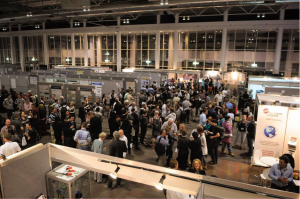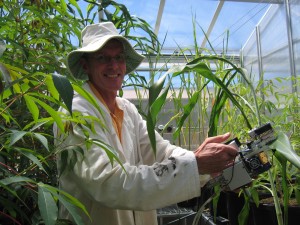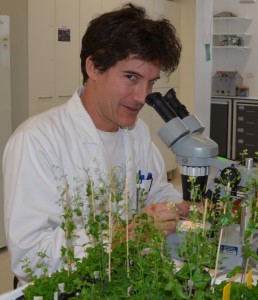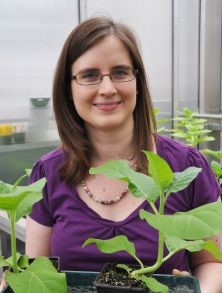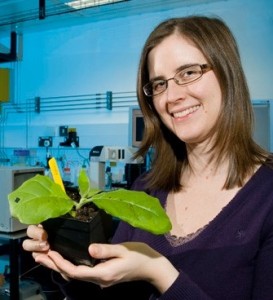Dobrý den!
Last week I attended the Society for Experimental Biology (SEB)’s Annual Main Meeting in the wonderful city of Prague in the Czech Republic.
Armed with a banner, a new batch of hot-off-the-press leaflets, some of our infamous GPC recycled paper pens, and a map of the world, the purpose of my trip was to staff an exhibitor’s booth at the conference to help raise awareness of the GPC and the projects and initiatives we are involved with.
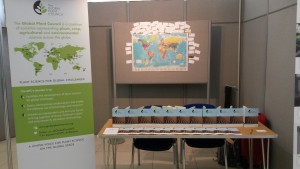 To encourage delegates to speak to the exhibitors, there was a chance to win prizes in exchange for a ‘passport’ filled with stickers or stamps collected from each of the booths. This gave me a fantastic opportunity to meet people from all over the world and tell them about the Global Plant Council – even the SEB’s Animal and Cell biologists!
To encourage delegates to speak to the exhibitors, there was a chance to win prizes in exchange for a ‘passport’ filled with stickers or stamps collected from each of the booths. This gave me a fantastic opportunity to meet people from all over the world and tell them about the Global Plant Council – even the SEB’s Animal and Cell biologists!
Many visitors to the booth were from Europe, but I also met people from as far away as Argentina, Australia, China and Vietnam. Thanks to everyone who visited the booth and gave me their email addresses to sign up for our monthly e-Bulletin newsletter!
“So what does the Global Plant Council actually do?”
This was the question I was most frequently asked at the conference. The answer is: many things! But to simplify matters, our overall remit falls into two main areas.
1) Enabling better plant science
Plant science has a critical role to play in meeting global challenges such as food security, hunger and malnutrition. The GPC currently has 29 member organizations, including the SEB, representing over 55,000 plant, crop, agricultural and environmental scientists around the world. By bringing these professional organizations together under a united global banner, we have a stronger voice to help influence and shape policy and decision-making at the global level. Our Executive Board and member organization representatives meet regularly and feed into international discussions and consultations.
The GPC also aims to facilitate more effective and efficient plant-based scientific research. Practically speaking, this means we organize, promote, provide support for, and assist with internationally collaborative projects and events. A good example is the Stress Resilience Symposium and Discussion Forum we are hosting, together with the SEB, in Brazil in October.
This meeting – which will be a satellite meeting of the International Plant Molecular Biology 2015 conference – will bring together scientists from across the world who are studying the mechanisms by which plants interact with and respond to their environments, particularly in the face of climate change. It will provide an excellent opportunity for researchers of all levels and from different regions to network and learn from each other, fostering new relationships and collaborations across borders. Registration and abstract submission is now open, so why not come along!
Importantly, as well as learning from researchers all over the world about the fantastic research they are doing, we also want to identify important research that is not being done, or which could be done better. Then, we can come together to discuss strategies to fund and fill these gaps.
You can find out more about our other current initiatives by going to our website.
2) Enabling better plant scientists
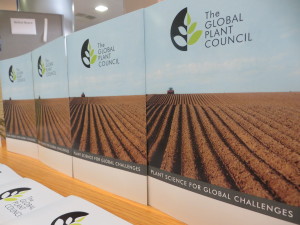 As well as physically bringing people together at meetings and events, the Global Plant Council aims to better connect plant scientists from around the world, promote plant research and funding opportunities, share knowledge and best practice, and identify reports, research tools, and educational resources.
As well as physically bringing people together at meetings and events, the Global Plant Council aims to better connect plant scientists from around the world, promote plant research and funding opportunities, share knowledge and best practice, and identify reports, research tools, and educational resources.
Plant scientists have created an amazing diversity of assets for research and education, so by facilitating access to and encouraging use of these resources, we hope that a desperately needed new generation of plant researchers will be inspired to continue working towards alleviating some of the world’s most pressing problems. For example, we’re translating plant science teaching materials into languages other than English, and are helping the American Society of Plant Biologists to curate content for Plantae.org, an online resource hub and gathering place for the plant science community that will be launched later this year – stay tuned!

My #SEBSelfie! Other updates from the meeting can be found by following the hashtag #SEBAMM on Twitter.
In addition, the GPC website is full of useful information including research and funding news, an events calendar, reports and white papers, fellowships and awards. We operate a Twitter account (@GlobalPlantGPC) for up-to-the-minute news and views, and a Spanish version @GPC_EnEspanol. We also have a blog (obviously!) that is regularly updated with interesting and informative articles written by the GPC staff, our two New Media Fellows, and plant scientists from across our member network. A Facebook page will be coming soon!
If you would like any more information about the projects and initiatives mentioned here, or more details about the GPC’s work, please do contact me (Lisa Martin, Outreach & Communications Manager): lisa@globalplantcouncil.org.





